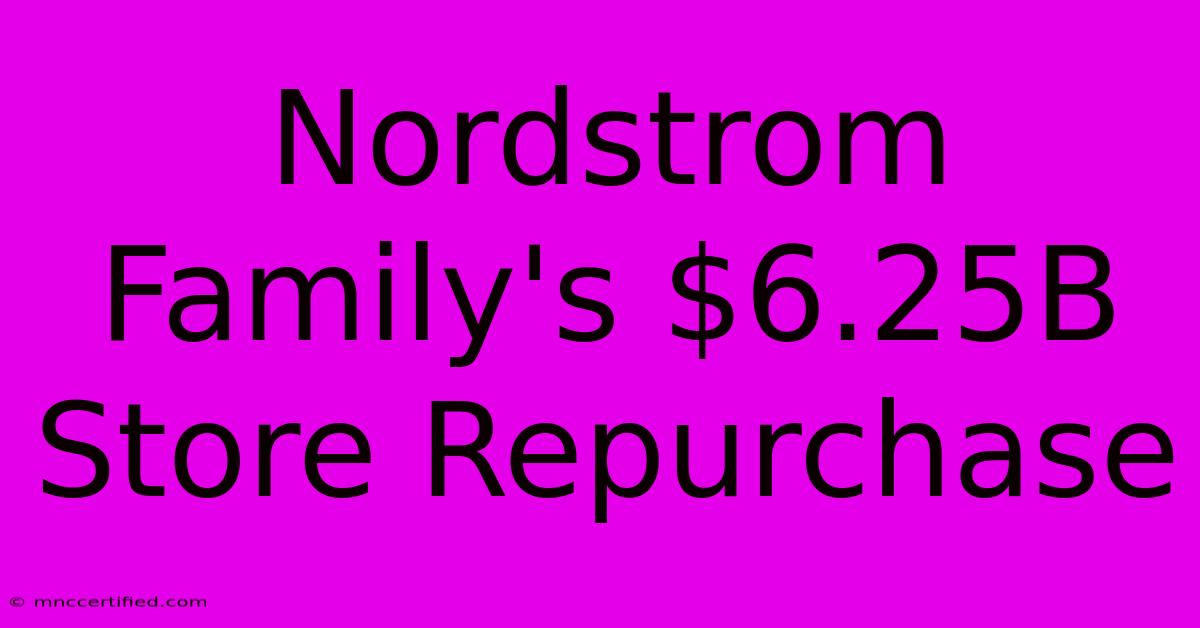Nordstrom Family's $6.25B Store Repurchase

Table of Contents
Nordstrom Family's $6.25B Store Repurchase: A Deep Dive into the Deal
The Nordstrom family's recent $6.25 billion offer to take the iconic department store chain private marks a significant moment in retail history. This move, spearheaded by the founding family, represents a bold bet on the future of Nordstrom, aiming to steer the company away from the pressures of short-term market fluctuations and focus on long-term strategic growth. This article delves deep into the deal's intricacies, analyzing its implications for Nordstrom, its competitors, and the wider retail landscape.
Understanding the Deal's Structure
The $6.25 billion offer translates to $52 per share, a premium of roughly 40% over Nordstrom's closing price before the announcement. This significant premium underscores the family's commitment to regaining complete control and reflects their belief in Nordstrom's long-term potential. The deal, structured as a leveraged buyout (LBO), will utilize a combination of equity from the Nordstrom family and debt financing.
Key Players and Their Roles
- The Nordstrom Family: The driving force behind the acquisition, aiming to execute a long-term strategic vision free from public market pressures. Their significant equity contribution demonstrates confidence in the company's future.
- Private Equity Firms: While not explicitly named in initial reports, private equity firms are likely playing a significant role in providing the debt financing needed for the LBO. Their involvement will influence the financial structure and long-term strategy.
- Nordstrom Shareholders: Their approval is crucial for the deal's success. The substantial premium offered aims to secure their support and ensure a smooth transition to private ownership.
Implications for Nordstrom
Taking Nordstrom private offers several potential benefits:
- Long-Term Strategic Focus: Free from quarterly earnings pressures, the Nordstrom family can implement long-term strategies without the constant scrutiny of Wall Street analysts. This could involve significant investments in e-commerce, supply chain optimization, and brand revitalization.
- Increased Flexibility: Private ownership allows for greater flexibility in decision-making, enabling faster adaptation to changing market conditions and consumer preferences. This agility is crucial in the dynamic retail landscape.
- Reduced Costs: Eliminating the costs associated with public company reporting and regulatory compliance can free up significant resources for reinvestment in the business.
- Potential for Restructuring: Private ownership provides an opportunity to restructure operations, potentially streamlining processes and improving efficiency. This could involve store closures, workforce adjustments, or changes to the product assortment.
Impact on Competitors and the Retail Landscape
Nordstrom's move to private ownership will undoubtedly have repercussions for its competitors. Other department stores, facing similar challenges in the evolving retail landscape, may find themselves under increased pressure. The deal could also spur consolidation within the industry, as other players seek to adapt and survive in a competitive market.
Challenges Ahead
Despite the potential benefits, the Nordstrom family faces significant challenges:
- Debt Burden: The leveraged buyout will leave Nordstrom with a substantial debt load, increasing financial risk and requiring careful management.
- Economic Uncertainty: The current economic climate presents uncertainties, potentially impacting consumer spending and Nordstrom's financial performance.
- Competition: The retail industry remains highly competitive, with ongoing challenges from e-commerce giants and other traditional retailers.
Conclusion: A Risky but Potentially Rewarding Venture
The Nordstrom family's $6.25 billion store repurchase is a high-stakes gamble. While the move carries significant financial risk, it also offers the potential for substantial rewards. The success of this venture hinges on the family's ability to navigate the challenges ahead, execute a compelling long-term strategy, and adapt to the ever-evolving retail landscape. Only time will tell whether this bold move will revitalize Nordstrom or mark a turning point in the broader department store sector. The coming years will be crucial in assessing the long-term impact of this significant transaction.
Keywords: Nordstrom, Nordstrom family, $6.25 billion, leveraged buyout, LBO, department store, retail, private equity, stock repurchase, take private, strategic growth, ecommerce, competition, retail landscape, economic uncertainty, restructuring.

Thank you for visiting our website wich cover about Nordstrom Family's $6.25B Store Repurchase. We hope the information provided has been useful to you. Feel free to contact us if you have any questions or need further assistance. See you next time and dont miss to bookmark.
Featured Posts
-
Buehler Joins Red Sox Deal Done
Dec 24, 2024
-
End Of An Era Hogan Dies
Dec 24, 2024
-
La Liga Real Madrid Up To Second Place
Dec 24, 2024
-
Gaetz Report Sex And Payment Details
Dec 24, 2024
-
Nordstrom To Go Private Family Buyout
Dec 24, 2024